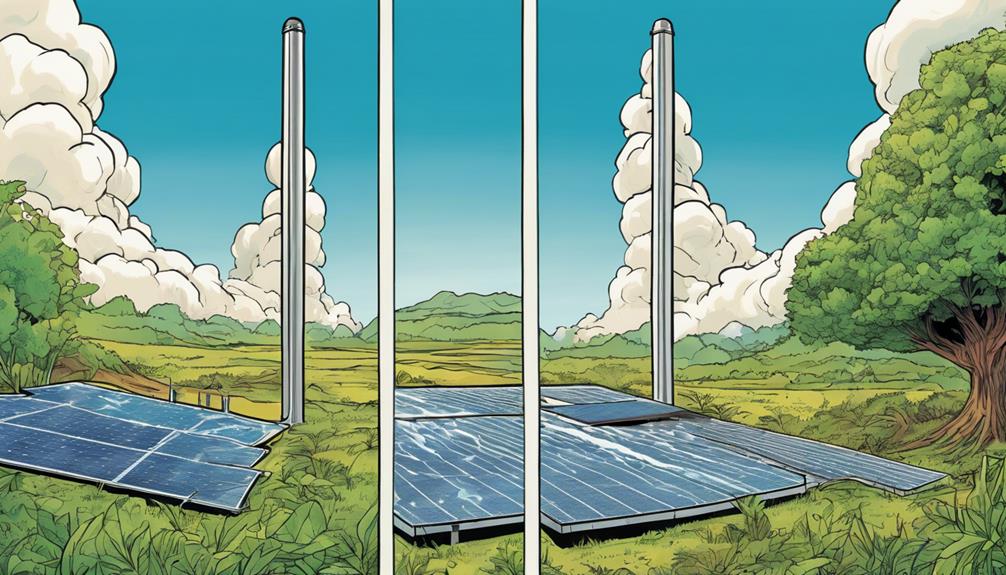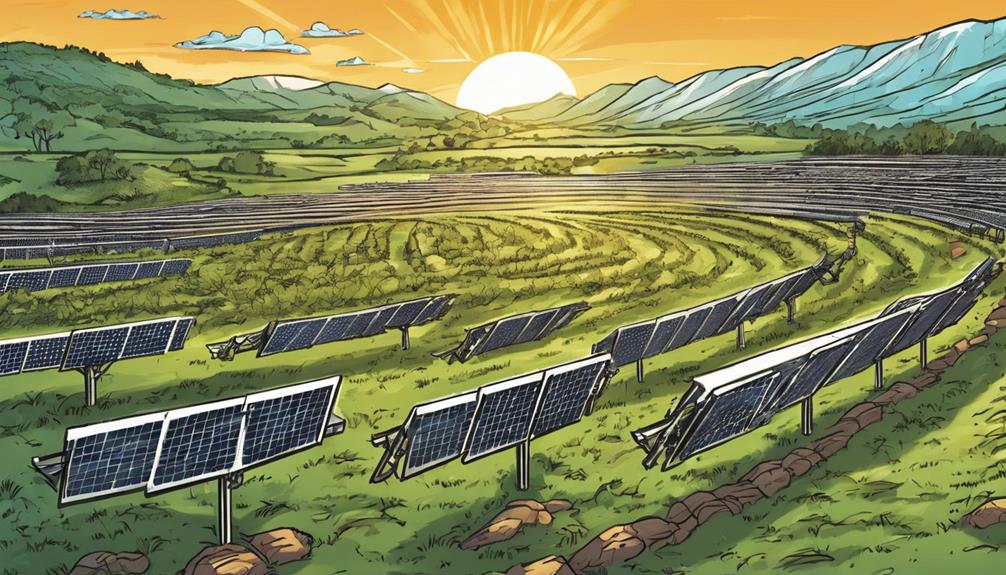Geothermal energy emerges as a clear winner in the battle for efficiency, boasting an impressive 90% efficiency rate compared to solar energy's 15-22% range, making it a more reliable and consistent source of power. I'm intrigued by the sheer difference in efficiency, and it's clear that geothermal energy provides a constant and reliable source of energy, unaffected by weather conditions. But that's not all – geothermal energy also has a smaller carbon footprint and requires less land. I'm curious to explore more about the environmental impacts and cost breakdowns of these two energy sources.
Key Takeaways
- Geothermal energy outperforms solar energy in efficiency, achieving 90% compared to solar's 15-22% for photovoltaic panels.
- Geothermal energy provides a constant and reliable source of energy, unaffected by weather conditions and daily fluctuations.
- Geothermal energy has a smaller carbon footprint and requires less land compared to solar energy, making it more environmentally friendly.
- Geothermal systems have higher upfront costs but lower long-term expenses, with a longer lifespan than solar systems.
- Geothermal energy is a more consistent and reliable energy source overall, making it a better option for powering homes and businesses.
Efficiency Showdown

What's the most efficient way to harness renewable energy: geothermal or solar power?
As I investigate the numbers, it's evident that geothermal energy takes the lead. Geothermal power plants can achieve efficiencies of around 90%, a stark contrast to solar energy's efficiency range of 15% to 22% for photovoltaic panels.
The reason lies in the variables that affect solar energy production, such as weather conditions, angle of sunlight, and panel quality.
Geothermal energy, on the other hand, provides a constant and reliable source of energy, unaffected by external factors.
In the efficiency showdown, geothermal energy emerges as the clear winner, making it a more reliable choice for those seeking consistent renewable energy.
Energy Source Comparison
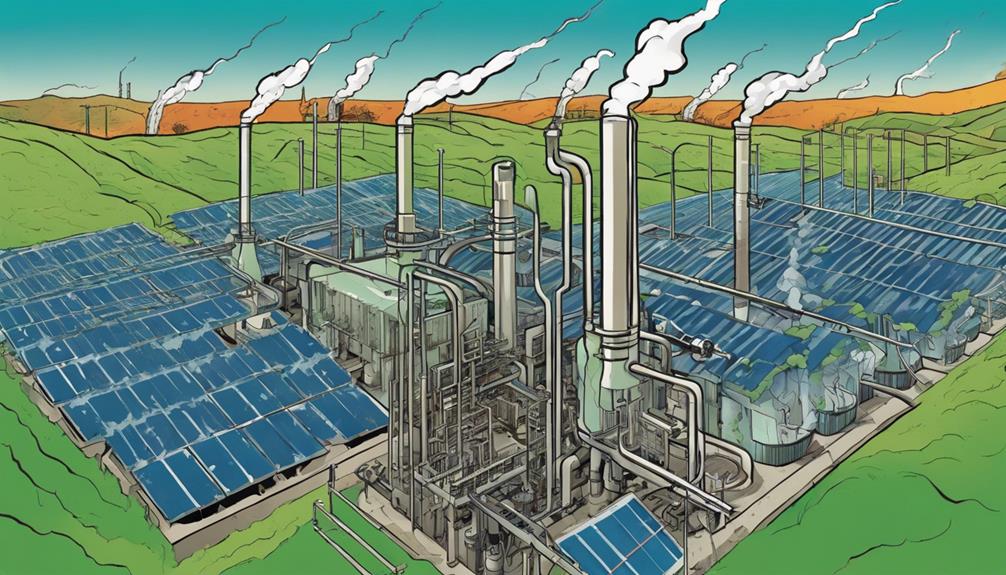
As I delve into the core of these renewable energy sources, it becomes clear that geothermal energy derives its power from the heat within the Earth's crust, whereas solar energy harnesses the sun's radiation.
This fundamental difference in energy source has significant implications for their reliability and consistency. Geothermal energy is considered a more constant and predictable energy source, unaffected by daily and seasonal variations. In contrast, solar energy availability is impacted by these fluctuations, making it a more intermittent energy source.
Understanding the distinct energy sources of geothermal and solar power is pivotal in evaluating their potential and limitations. This difference in energy source is a key factor in determining which technology is best suited for specific energy needs.
Environmental Impacts
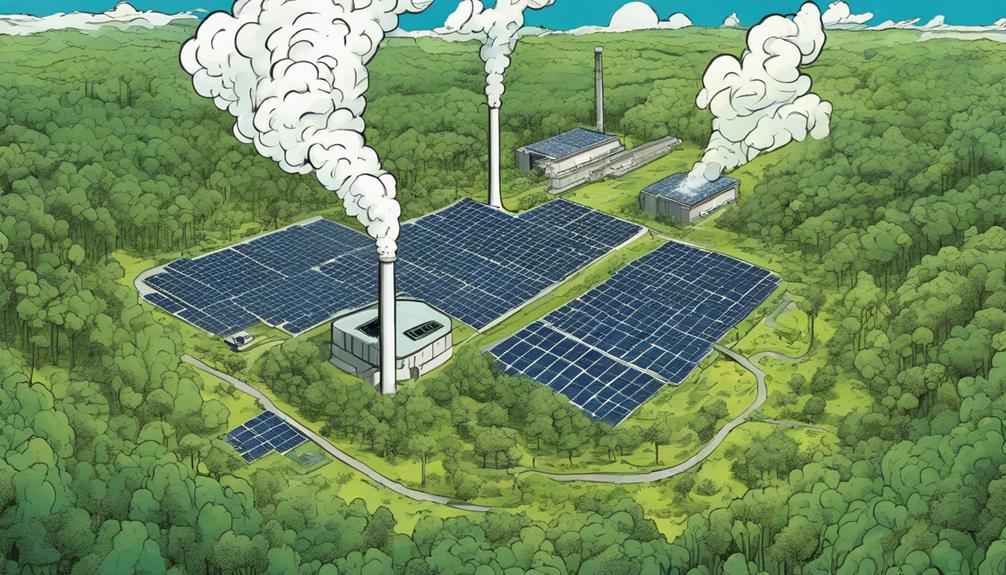
Geothermal energy's environmentally friendly profile stands out, with a noticeably smaller carbon footprint compared to solar energy, largely due to the reduced land requirements and minimal waste generation during operation.
In contrast, solar energy production has a larger environmental impact, mainly stemming from the manufacturing process. Although solar panels can be recycled, their production phase contributes significantly to greenhouse gas emissions. Additionally, solar panels occupy more land, which can lead to habitat disruption and biodiversity loss.
Geothermal systems, on the other hand, are water-free and don't consume resources during energy production. This makes geothermal energy a more environmentally conscious choice, especially for areas where land is scarce or sensitive ecosystems exist.
Cost Breakdown
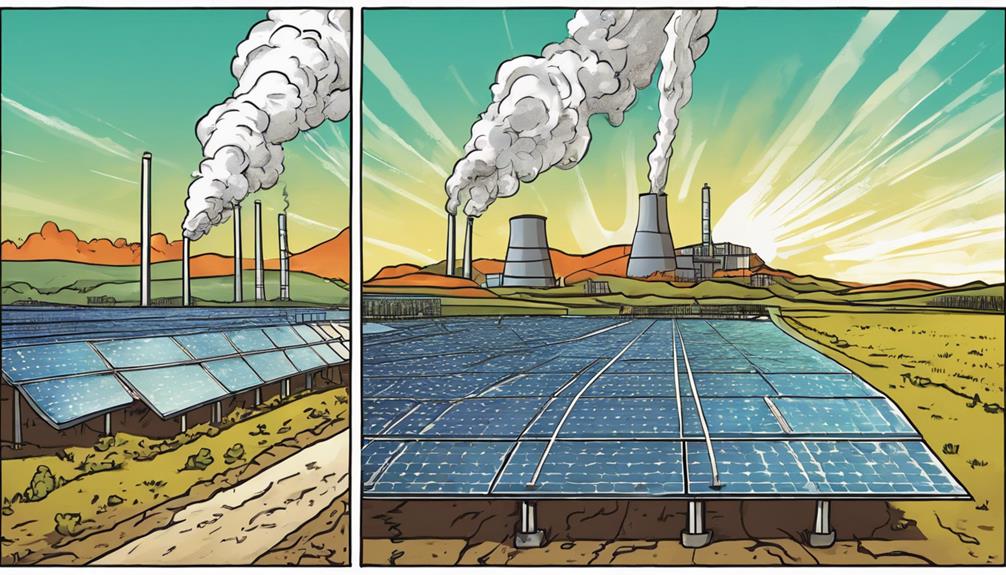
When it comes to the cost of harnessing renewable energy, I'm weighing the upfront investments and long-term expenses of geothermal and solar systems to determine which one offers the most cost-effective solution.
While geothermal energy systems have higher upfront costs, they make up for it with lower long-term operational expenses. In contrast, solar energy systems have lower initial investments but require more frequent maintenance and panel replacements, increasing their overall cost.
Geothermal systems also have a longer lifespan, which reduces their overall cost. Considering these factors, geothermal energy seems to be the more cost-effective option in the long run. However, the cost-effectiveness of each system ultimately depends on factors like location and energy needs.
Key Takeaways

After weighing the pros and cons of geothermal and solar energy, I've distilled the essential differences between these two renewable energy sources into five key takeaways.
To begin, geothermal energy boasts a higher efficiency than solar energy, with power plants achieving around 90% efficiency.
Following that, geothermal energy provides a constant and reliable source of energy, unaffected by weather conditions.
Moving on, geothermal energy has a smaller carbon footprint and requires less land compared to solar energy.
Additionally, geothermal systems have a longer lifespan and lower long-term operational expenses.
Lastly, geothermal energy is a more consistent and reliable energy source overall. These takeaways should guide your decision when choosing between these two renewable energy sources.
Frequently Asked Questions
Can Geothermal Energy Be Used for Heating and Cooling Buildings?
"I'm curious about geothermal energy's versatility. Yes, it can be used for heating and cooling buildings by leveraging the Earth's natural temperature to provide efficient and eco-friendly HVAC solutions, reducing energy costs."
How Does the Installation Process Differ for Geothermal and Solar Systems?
"I recall a friend's backyard transformation, where a geothermal system was installed with underground pipes, whereas solar panels were simply mounted on the roof. The installation process for geothermal is more invasive, requiring excavation, whereas solar is relatively straightforward."
Are There Any Government Incentives for Adopting Geothermal Energy?
"I've explored the benefits of geothermal energy, and yes, there are government incentives to encourage its adoption. Tax credits, grants, and state-based initiatives can help offset the higher upfront costs of geothermal systems."
Can Geothermal Energy Be Used in Conjunction With Other Renewable Sources?
"I remember hiking through Yellowstone, feeling the earth's heat beneath my feet. Yes, geothermal energy can be used in conjunction with other renewable sources, creating a powerful synergy that amplifies their collective impact."
What Are the Potential Risks and Challenges Associated With Geothermal Energy?
As I explore geothermal energy, I realize that potential risks include induced seismicity, land subsidence, and scaling, which can impact system efficiency and longevity, requiring careful site selection and management.
How Can Geothermal Energy Revolutionize Energy Conservation Like Solar Energy?
Geothermal energy is revolutionizing geothermal conservation strategies, much like solar energy revolutionized solar power. By harnessing natural heat from the Earth, we can reduce our reliance on fossil fuels and minimize environmental impact. Geothermal energy has the potential to provide a sustainable and efficient source of power for the future.
Conclusion
As I emerge from this energy battle, I'm left with a profound realization: neither geothermal nor solar energy is a clear winner. Both have their strengths and weaknesses, and the verdict ultimately depends on our priorities.
But one thing is certain – our reliance on fossil fuels must end. The fate of our planet hangs in the balance, and it's time to harness the power of renewables.
The future is at stake, and the choice is ours.
